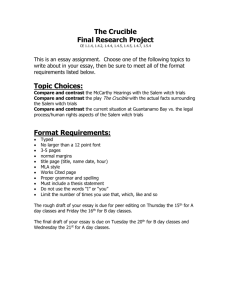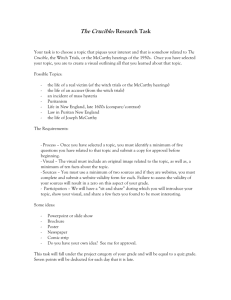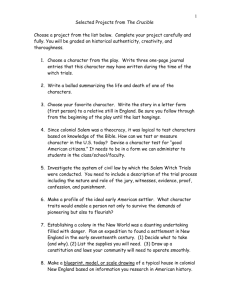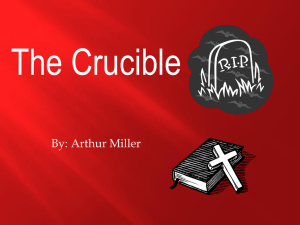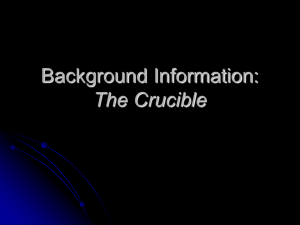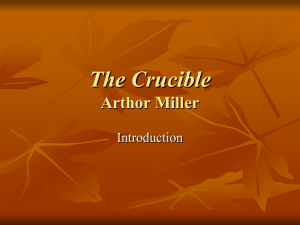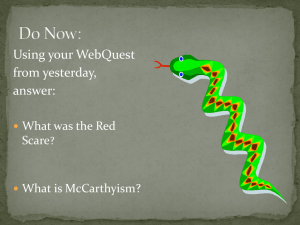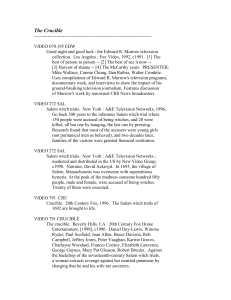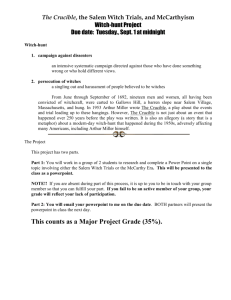Unit Overview Revisions
advertisement
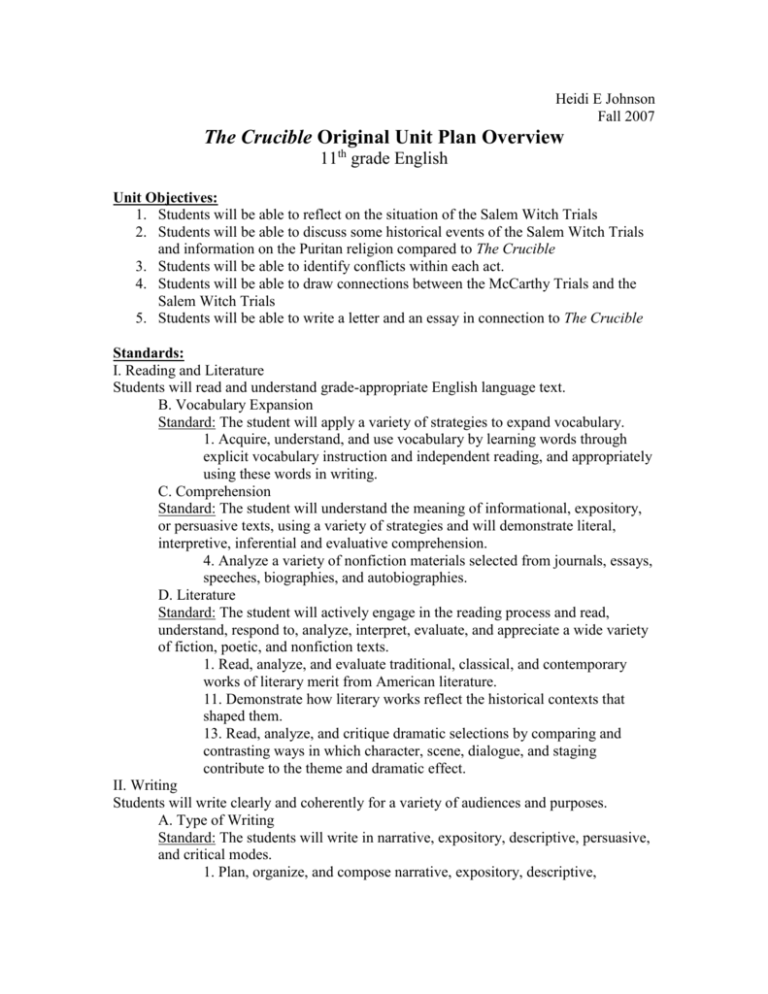
Heidi E Johnson Fall 2007 The Crucible Original Unit Plan Overview 11th grade English Unit Objectives: 1. Students will be able to reflect on the situation of the Salem Witch Trials 2. Students will be able to discuss some historical events of the Salem Witch Trials and information on the Puritan religion compared to The Crucible 3. Students will be able to identify conflicts within each act. 4. Students will be able to draw connections between the McCarthy Trials and the Salem Witch Trials 5. Students will be able to write a letter and an essay in connection to The Crucible Standards: I. Reading and Literature Students will read and understand grade-appropriate English language text. B. Vocabulary Expansion Standard: The student will apply a variety of strategies to expand vocabulary. 1. Acquire, understand, and use vocabulary by learning words through explicit vocabulary instruction and independent reading, and appropriately using these words in writing. C. Comprehension Standard: The student will understand the meaning of informational, expository, or persuasive texts, using a variety of strategies and will demonstrate literal, interpretive, inferential and evaluative comprehension. 4. Analyze a variety of nonfiction materials selected from journals, essays, speeches, biographies, and autobiographies. D. Literature Standard: The student will actively engage in the reading process and read, understand, respond to, analyze, interpret, evaluate, and appreciate a wide variety of fiction, poetic, and nonfiction texts. 1. Read, analyze, and evaluate traditional, classical, and contemporary works of literary merit from American literature. 11. Demonstrate how literary works reflect the historical contexts that shaped them. 13. Read, analyze, and critique dramatic selections by comparing and contrasting ways in which character, scene, dialogue, and staging contribute to the theme and dramatic effect. II. Writing Students will write clearly and coherently for a variety of audiences and purposes. A. Type of Writing Standard: The students will write in narrative, expository, descriptive, persuasive, and critical modes. 1. Plan, organize, and compose narrative, expository, descriptive, persuasive, critical, and research writing to address a specific audience and purpose. Key Questions Answered in Unit: 1. How do the Salem Witch Trials and the McCarthy Trials connect to The Crucible? 2. How did the views of the Puritan religion affect the outcome of the Salem Witch Trials and how is that shown in The Crucible? 3. How does writing as if you are in the Salem Witch Trials help improve your writing skills? Previous Knowledge: 1. Students will have a vague knowledge of what the Salem Witch Trials were about. 2. Students will have heard of the McCarthy Trials. 3. Students will know how to write a letter. 4. Students will know how to write a five paragraph essay. 5. Students will know what a conflict is in a piece of literature. Declarative Knowledge: 1. Students will learn facts about the McCarthy Trials and the Salem Witch Trials. 2. Students will learn facts about the Puritan religion. 3. Students will learn how history can affect literature. 4. Students will learn what a proverb is and how proverbs relate to literature. Procedural Knowledge: 1. Students will learn how to connect literature to the historical content on which it is based. 2. Students will learn how to understand a play and its contents. Connections between objectives, standards, and questions: I chose to focus on the connection between this play and the historical events that inspired Miller to write this play. It is important to understand this connection because understanding that people were actually hanged on false pretenses makes The Crucible more accessible to the reader. It is also important that the students improve their vocabulary by learning new vocabulary connected to the play. It is also important that students improve their writing skills by writing in different forms. For example, they will be writing a letter and an essay but both of them connect to the play. I also chose to focus on how the Puritan religion influenced the decisions made by both the court and the accused in both the Salem Witch Trials and The Crucible. It is important for students to understand this because they will then be able to think about how they would react to the same situation based on their beliefs. Timeline of Unit Plan: Day 1 Day 2 Day 3 Day 4 Day 5 Day 6 Day 7 Day 8 Day 9 Day 10 Day 11 Day 12 Day 13 Day 14 Day 15 Day 16 Pre-test on Salem Witch Trials, Puritanism, McCarthy Trials, and The Crucible Simulation activity PowerPoint: Salem Witch Trials, Puritanism, McCarthy Trials Character Profiling: Wanted Posters Present Character Profiles Hand out books Vocabulary Scramble: Act I Anticipation Activity Read Act I Accountability Check: Act I Conflict Worksheet Vocabulary Scramble: Act II Read Act II Finish Act II Accountability Check: Act II Proverbs activity Proverbs Activity Vocabulary Scramble: Act III Read Act III Accountability Check: Act III McCarthy reading and questions Finish McCarthy activity Vocabulary Scramble: Act IV Read Act IV Accountability Check: Act IV John Proctor’s letter Write own letter In-class essay Post test Scenario activity (if time) Extra day for room if we don’t get something done and need one more day Cultural Connections: The Salem Witch Trials and the McCarthy trials were a part of our American history. The McCarthy trials in particular affected many of the famous people in the 50’s and affected American life all together. Also, there were still slaves in the time of the Salem Witch Trials and Tituba shows how slaves were treated during that time. Literacy Strategies: The most important literacy strategy used in this lesson is reading aloud. Students are probably not used to reading plays and to read them aloud will help with their comprehension. Developmental Appropriateness: I think this unit is developmentally appropriate because we will be doing all of the reading in class and, most of it, aloud. Therefore, it will help all of my students with comprehension and, especially, my ELL students. Students will also be writing a letter and an essay which is an appropriate writing level for juniors. They should be able to write both before they graduate from high school. Technology: Students will be taking notes on a PowerPoint presentation and video. They will also be using the computer lab to write their in-class essays in which they will be word processing. If I had more time with the lesson, I may have them research Puritans or either of the trials which would be more technology. Unit Evaluation: The major portions of the unit will come from the assessments after each act and the final test. These will be graded objectively because they are either multiple choice, matching, and true/false. Lesson Number Type of Assignment Total Points 1 simulation activity 5 (participation points) 2 PowerPoint notes 5 (participation points) 3 Wanted Posters 15 5 Accountability Act I 50 5 Conflict Worksheet 5 (participation points) 7 Accountability Act II 60 7 Proverbs activity 10 10 Accountability Act III 81 10 McCarthy questions 5 (participation points) 13 Accountability Act IV 102 13 Witch Trial Letter 10 14 In-class essay 20 15 Post-Test ?? 15 Scenario (if time) 5 (participation points) Materials and Resources: Copies of The Crucible Pre-test Vocabulary Scramble envelopes: Act I, II, III, and IV PowerPoint Wanted Poster templates Anticipation Worksheet Accountability Checks: Act I, II, III, and IV Conflict Worksheet Proverbs worksheet McCarthy reading McCarthy reading questions John Proctor’s Letter In-class Essay prompt Post Test Scenario Activity The Crucible Revised Unit Plan Overview 11th grade English Unit Objectives: 6. Students will be able to reflect on the situation of the Salem Witch Trials 7. Students will be able to discuss some historical events of the Salem Witch Trials and information on the Puritan religion compared to The Crucible 8. Students will be able to identify conflicts within each act. 9. Students will be able to draw connections between the McCarthy Trials and the Salem Witch Trials 10. Students will be able to write a letter and an essay in connection to The Crucible Standards: I. Reading and Literature Students will read and understand grade-appropriate English language text. B. Vocabulary Expansion Standard: The student will apply a variety of strategies to expand vocabulary. 1. Acquire, understand, and use vocabulary by learning words through explicit vocabulary instruction and independent reading, and appropriately using these words in writing. C. Comprehension Standard: The student will understand the meaning of informational, expository, or persuasive texts, using a variety of strategies and will demonstrate literal, interpretive, inferential and evaluative comprehension. 4. Analyze a variety of nonfiction materials selected from journals, essays, speeches, biographies, and autobiographies. D. Literature Standard: The student will actively engage in the reading process and read, understand, respond to, analyze, interpret, evaluate, and appreciate a wide variety of fiction, poetic, and nonfiction texts. 1. Read, analyze, and evaluate traditional, classical, and contemporary works of literary merit from American literature. 11. Demonstrate how literary works reflect the historical contexts that shaped them. 13. Read, analyze, and critique dramatic selections by comparing and contrasting ways in which character, scene, dialogue, and staging contribute to the theme and dramatic effect. II. Writing Students will write clearly and coherently for a variety of audiences and purposes. A. Type of Writing Standard: The students will write in narrative, expository, descriptive, persuasive, and critical modes. 1. Plan, organize, and compose narrative, expository, descriptive, persuasive, critical, and research writing to address a specific audience and purpose. Key Questions Answered in Unit: 4. How do the Salem Witch Trials and the McCarthy Trials connect to The Crucible? 5. How did the views of the Puritan religion affect the outcome of the Salem Witch Trials and how is that shown in The Crucible? 6. How does writing as if you are in the Salem Witch Trials help improve your writing skills? Previous Knowledge: 6. Students will have a vague knowledge of what the Salem Witch Trials were about. 7. Students will have heard of the McCarthy Trials. 8. Students will know how to write a letter. 9. Students will know how to write a five paragraph essay. 10. Students will know what a conflict is in a piece of literature. Declarative Knowledge: 5. Students will learn facts about the McCarthy Trials and the Salem Witch Trials. 6. Students will learn facts about the Puritan religion. 7. Students will learn how history can affect literature. 8. Students will learn what a proverb is and how proverbs relate to literature. Procedural Knowledge: 3. Students will learn how to connect literature to the historical content on which it is based. 4. Students will learn how to understand a play and its contents. Connections between objectives, standards, and questions: I chose to focus on the connection between this play and the historical events that inspired Miller to write this play. It is important to understand this connection because understanding that people were actually hanged on false pretenses makes The Crucible more accessible to the reader. It is also important that the students improve their vocabulary by learning new vocabulary connected to the play. It is also important that students improve their writing skills by writing in different forms. For example, they will be writing a letter and an essay but both of them connect to the play. I also chose to focus on how the Puritan religion influenced the decisions made by both the court and the accused in both the Salem Witch Trials and The Crucible. It is important for students to understand this because they will then be able to think about how they would react to the same situation based on their beliefs. Timeline of Unit Plan: Day 1 Day 2 Day 3 Day 4 Day 5 Day 6 Day 7 Day 8 Day 9 Day 10 Day 11 Day 12 Day 13 Day 14 Day 15 Day 16 Day 17 Day 18 Day 29 Day 20 Pre-test on Salem Witch Trials, Puritanism, McCarthy Trials, and The Crucible Simulation activity Character Profiling: Wanted Posters Present Character Profiles Vocabulary Scramble: Act I Part I of PowerPoint: Salem Witch Trials, Puritanism, McCarthy Trials Anticipation Activity Read part of Act I Finish Act I Conflict Worksheet Watch Act I of movie Character information packet Act I review questions Finish Character information packet Begin Act II Finish Act II Act II review questions Proverbs activity Vocabulary Scramble: Act II Poem “Half-Hanged Mary” McCarthy reading and questions Discussion of first half of play Finish McCarthy activity Create-Own Crossword McCarthy Cartoons Watch Act III Vocabulary activity Begin Act IV Finish Act IV Full play discussion John Proctor’s letter Write letter from jail cell Junior Seminar REVIEW DAY Final test Cultural Connections: The Salem Witch Trials and the McCarthy trials were a part of our American history. The McCarthy trials in particular affected many of the famous people in the 50’s and affected American life all together. Also, there were still slaves in the time of the Salem Witch Trials and Tituba shows how slaves were treated during that time. Literacy Strategies: The most important literacy strategy used in this lesson is reading aloud. Students are probably not used to reading plays and to read them aloud will help with their comprehension. Developmental Appropriateness: I think this unit is developmentally appropriate because we will be doing all of the reading in class and, most of it, aloud. Therefore, it will help all of my students with comprehension and, especially, my ELL students. Students will also be writing a letter and an essay which is an appropriate writing level for juniors. They should be able to write both before they graduate from high school. Technology: Students will be taking notes on a PowerPoint presentation and video. They will also be using the computer lab to write their in-class essays in which they will be word processing. If I had more time with the lesson, I may have them research Puritans or either of the trials which would be more technology. Unit Evaluation: The major portions of the unit will come from the assessments after each act and the final test. These will be graded objectively because they are either multiple choice, matching, and true/false. Lesson Number Type of Assignment Total Points 1 simulation activity 5 (participation points) 2 PowerPoint notes 5 (participation points) 3 Wanted Posters 15 5 Conflict Worksheet 5 (participation points) 6 Character Information 5 6 Act 1 Review Questions 13 8 Act II Review Questions 9 9 Proverbs activity 10 10 “Half-Hanged Mary” 18 12 McCarthy Questions 5 12 Create-Own-Crossword 15 13 McCarthy Cartoons 5 (Participation Points) 17 Proctor’s Letter 20 20 Post-Test 80 Materials and Resources: Copies of The Crucible Pre-test Vocabulary Scramble envelopes: Act I, II, III, and IV PowerPoint Wanted Poster templates Anticipation Worksheet Accountability Checks: Act I, II, III, and IV Conflict Worksheet Proverbs worksheet McCarthy reading McCarthy reading questions John Proctor’s Letter In-class Essay prompt Post Test Scenario Activity
